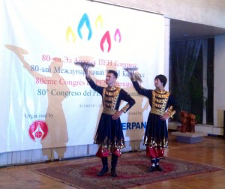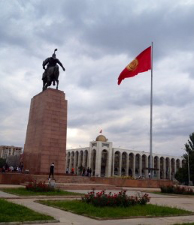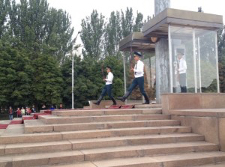Posts Tagged ‘PEN International 80th Congress’
PEN on the Plains of Central Asia
PEN International’s 80th Congress opened with galloping horses across the majestic plains of Central Asia’s Kyrgyzstan this past week when the 200 plus delegates from 73 PEN centers around the world encountered “Kurmanjan Datka: Queen of the Mountains” the epic new film featuring Kyrgyzstan’s national heroine. The cinematically stunning drama spanned the late18th to 19th century when the modern nation formed, led by a woman—wife, widow and mother—in a time when women had no rights, when enemies threatened on all sides. The drama ended with Russia’s annexation of the region.

A hundred years later PEN delegates gathered in Bishkek for PEN’s annual Congress whose theme My language, my story, my freedom included discussion, debate and advocacy on issues of free expression. PEN called for release of Uzbek writer Azinjon Askarov from a Kyrgyz prison, Vladimir Kozlov from Kazak prison and Ilham Tohti, who was recently given a life sentence in China for alleged “separatism.” These three individuals were featured with empty chairs at the Congress and represented the more than 900 writers, journalists, publishers, editors and bloggers listed in PEN’s case list and for whom PEN advocates.
Kyrgyzstan is considered the freest of the Central Asian republics of the former Soviet Union, the only republic that could have hosted a PEN Congress, but it is still challenged with ethnic conflicts and with repression of certain minorities, including those from the LGBT communities. The influence of the Russian Federation, including its Law of False Accusation and criminal defamation and laws against “gay propaganda,” the influence of radical Islam and ethnic conflicts affect free expression in the country, according to Marian Botsford Fraser, the Chair of PEN International’s Writers in Prison Committee.
Before the Congress, PEN International’s President John Ralston Saul and a delegation visited neighboring Kazakhstan and met with the President’s office there to present PEN’s concerns, especially for imprisoned writers Vladimir Kozlov and Aron Atabek. In Bishkek a delegation met with the President of Kyrgyzstan on PEN’s issues and with the federal Prosecutor on the case of Azinjon Askarov.
PEN held panels and discussions on LGBTQI rights, on surveillance, on criminal defamation, and on linguistitic rights. Resolutions on free expression and the cases of imprisoned and threatened writers were passed relating to Azerbaijan, China, Tibet, Cuba, Ethiopia, Eritrea, Honduras, Iran, Iraq, Kyrgyzstan, Mexico, North Korea, Russia, Syria, Turkey, Ukraine, and Vietnam.
PEN voted in four new centers—Liberia, Honduras, Wales, and an Eritrean center in exile, whose member reported on the many writers who are in prison and who have died there, bringing the total number of centers to 147 around the world.
In the capitol of Bishkek galloping horses are now replaced by ever present taxis—used cars from Europe and Japan with steering wheels on both the left and the right hand sides. Monuments and buildings from the Soviet era are strained with wear though guards still goose step around their peripheries. Members of Central Asian PEN welcomed the delegates with hospitality, with literature, with traditional songs and dance, with modern cinema about the past and with a hope of embracing broader freedoms in the future.

